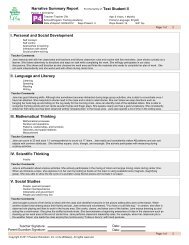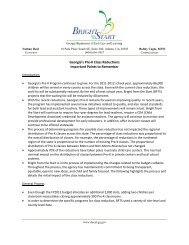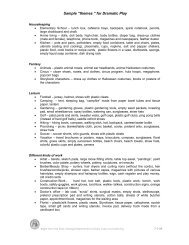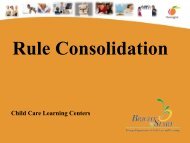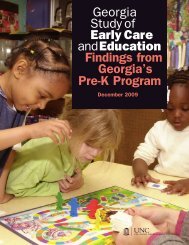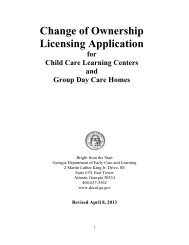Georgia Study of Early Care and Education: Child - Bright from the ...
Georgia Study of Early Care and Education: Child - Bright from the ...
Georgia Study of Early Care and Education: Child - Bright from the ...
You also want an ePaper? Increase the reach of your titles
YUMPU automatically turns print PDFs into web optimized ePapers that Google loves.
<strong>Georgia</strong> <strong>Study</strong> <strong>of</strong><br />
<strong>Early</strong> <strong>Care</strong> <strong>and</strong> <strong>Education</strong>:<br />
<strong>Child</strong> <strong>Care</strong> Center Findings<br />
Nationwide, most young children are cared for regularly by someone o<strong>the</strong>r<br />
than <strong>the</strong>ir parents. Twenty percent (20%) <strong>of</strong> all infants <strong>and</strong> toddlers <strong>and</strong><br />
44% <strong>of</strong> all three- <strong>and</strong> four-year-olds are served in a center-based care<br />
arrangement. The percentages are higher in <strong>the</strong> Sou<strong>the</strong>astern part <strong>of</strong> <strong>the</strong><br />
U.S.: 25% <strong>of</strong> all infants <strong>and</strong> toddlers <strong>and</strong> 56% <strong>of</strong> preschoolers are served in<br />
child care centers. 1 Research has demonstrated a modest but statistically<br />
significant link 2 between <strong>the</strong> quality <strong>of</strong> child care <strong>and</strong> children’s academic<br />
<strong>and</strong> social skills. 3, 4, 5 Research on brain development has underscored <strong>the</strong><br />
importance <strong>of</strong> providing high quality experiences for young children. 6,7<br />
Thus, improving child care quality is an important strategy for supporting<br />
children’s readiness for school success.<br />
<strong>Bright</strong> <strong>from</strong> <strong>the</strong> Start: <strong>Georgia</strong> Department <strong>of</strong> <strong>Early</strong> <strong>Care</strong> <strong>and</strong> Learning<br />
(DECAL) has been working to define <strong>and</strong> promote high quality practices<br />
across multiple types <strong>of</strong> child care settings. A statewide committee began<br />
working in <strong>the</strong> fall <strong>of</strong> 2006 to develop indicators to define quality in <strong>Georgia</strong>’s<br />
early care <strong>and</strong> education system. In <strong>the</strong> fall <strong>of</strong> 2007, DECAL contracted with<br />
researchers <strong>from</strong> <strong>the</strong> FPG <strong>Child</strong> Development Institute at <strong>the</strong> University <strong>of</strong><br />
North Carolina at Chapel Hill to help refine <strong>the</strong> indicators, develop tools<br />
to measure <strong>the</strong>m, <strong>and</strong> plan a study <strong>of</strong> <strong>the</strong> quality <strong>of</strong> care across <strong>the</strong> state. 8<br />
DECAL decided that a statewide study would help policymakers better<br />
underst<strong>and</strong> <strong>the</strong> quality <strong>of</strong> care across <strong>Georgia</strong>, inform <strong>the</strong>ir decisions about<br />
strategies to maximize investments in quality, <strong>and</strong> provide baseline data<br />
<strong>from</strong> which to measure quality improvements.<br />
In 2008–09, FPG conducted a statewide study <strong>of</strong> r<strong>and</strong>omly selected licensed<br />
child care centers <strong>and</strong> <strong>Georgia</strong>’s Pre-K programs, collecting data on <strong>the</strong><br />
observed classroom quality <strong>and</strong> characteristics <strong>of</strong> <strong>the</strong>se programs. The<br />
current report provides an overview <strong>of</strong> <strong>the</strong> study <strong>and</strong> summarizes findings<br />
<strong>from</strong> infant, toddler, <strong>and</strong> preschool classrooms in child care centers. Findings<br />
about <strong>Georgia</strong>’s Pre-K classrooms, both in centers <strong>and</strong> in schools, can be<br />
found in a companion report, <strong>Georgia</strong> <strong>Study</strong> <strong>of</strong> <strong>Early</strong> <strong>Care</strong> <strong>and</strong> <strong>Education</strong>:<br />
Findings <strong>from</strong> <strong>Georgia</strong>’s Pre-K Program.<br />
“Critical aspects<br />
<strong>of</strong> brain architecture<br />
begin to be shaped<br />
by experience<br />
before <strong>and</strong><br />
soon after birth,<br />
<strong>and</strong> many<br />
fundamental<br />
aspects <strong>of</strong> that<br />
architecture are<br />
established<br />
well before<br />
a child<br />
enters<br />
school.”<br />
National Scientific Council<br />
on <strong>the</strong> Developing <strong>Child</strong>,<br />
p. 1.<br />
1









